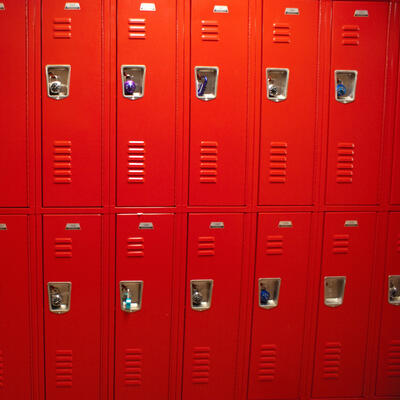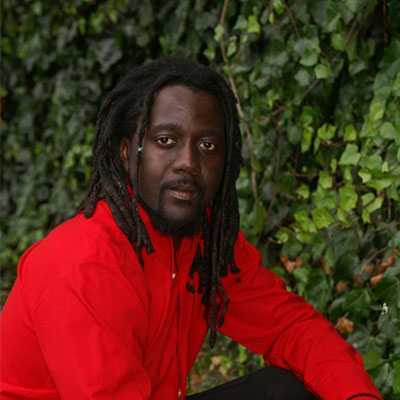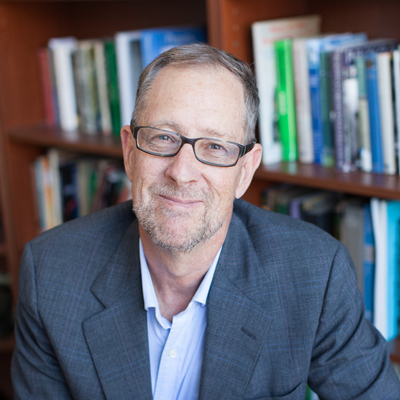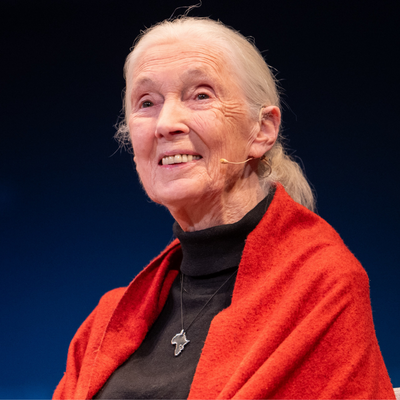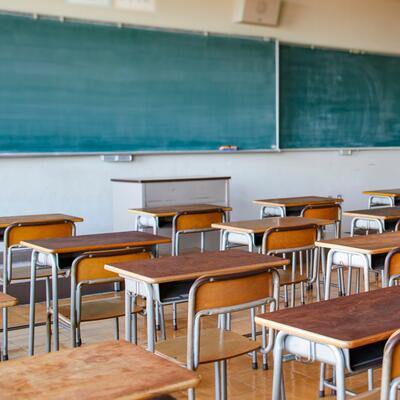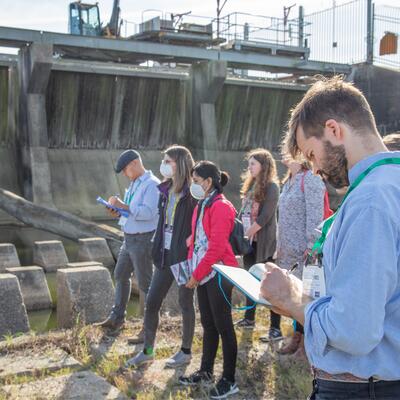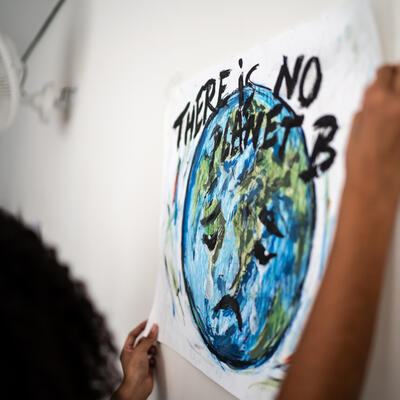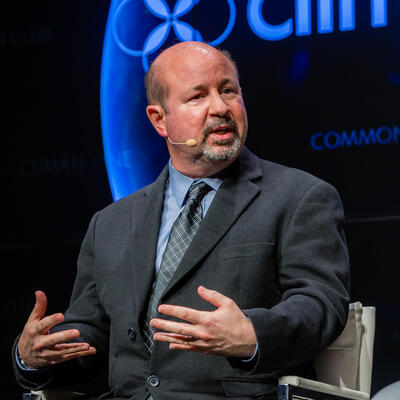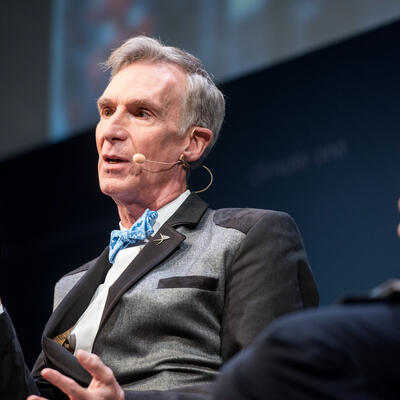Greg Dalton: I'm Greg Dalton. And today on Climate One, we're talking about green-agers. American youth now in high school and college are coming of age in an era of fossil fuel to wild weather. Severe flood, storms and fires are on the rise, and are forecast to increase further as carbon pollution increases. Stabilizing the earth's climate that supports our economy and our lifestyle is going to require big changes in the way we produce food and energy, manage water and get around. It's a huge challenge. The payoff is more sustainable economy and healthier communities. Over the next hour, we'll look at what's happening in school classrooms and lunchrooms in California and other states. What are students learning about the causes, consequences and solutions to climate volatility? What are they doing to become part of the solution while they're still in school?
To have this conversation, we came to Lick-Wilmerding High School in San Francisco. Our guests are three people working to educate and prepare students to build a cleaner and more resilient future. AshEl Eldridge is education and leadership manager at the Alliance for Climate Education, a non-profit group based in Oakland.
Heather Frambach is a statewide food systems coordinator at the Community Alliance with Family Farmers. And
Mark McCaffrey is program and policy director at the National Center for Science Education. Please welcome them to Climate One.
[Applause]
AshEl Eldridge, let's begin with you. Tell us your personal story how you came to be a climate champion and using your artistic work. So tell us that.
AshEl Eldridge: Yeah. Well, I was working with at Green For All with Van Jones. I'm not sure if people are familiar with him, a champion for green jobs, green communities. Right now he's on CNN with Crossfire who does a bunch of things, now Rebuild a Dream. But I started working with him and started traveling around the country actually communicating with different communities, dealing with climate change in our own really unique ways in supplying solutions. And so as I was saying, there are all sorts of artists who are rock like Bassnectar, rocked with, like, Wu-Tang, a lot of different folks.
So after Green For All, Alliance for Climate Education, I was like, "Wow, that's perfect. That's what we need." We need someone who can communicate these issues but also be entertaining, and perform and present this information in really compelling ways. So that's how I got to be with Alliance for Climate Education, presenting to over 150,000 high school students in the Bay Area and having a lot of fun doing it and being inspired really by what's going on in communities.
Greg Dalton: Great, thank you.
Heather Frambach, you recently moved to California from Texas. Tell us how you got to the Community Alliance with Family Farmers in this part of food part of the climate issue.
Heather Frambach: Sure, absolutely. I'm actually from California. I'm originally from San Jose and I moved to Austin, Texas, to go to grad school, and kind of at the beginning of grad school end of college, I was really into labor justice organizing and I was really trying to explore – I'm half Mexican-American and I was really into searching for my roots in the Texas-Mexico border where my family is from and got involved with a couple of organizations including one where I led solidarity delegations down to the border and looked at women who are working in maquiladoras which are basically sweatshops, organizing for their rights. So taking that justice framework, I ended up kind of getting more into food and looking into how justice intersects with local food systems. So in graduate school, I kind of really ate up everything there was to do around food. I worked as a delivery driver. I worked at the school cafeteria at UT Austin, got to know the executive chef and how that campus food system works. I worked for the city's Sustainable Food Policy Board and was able to take part of a process where I contributed language to the city's comprehensive plan which is a big document that kind of lays out how the city is going to be governed for the next 30 years.
I became an organizer with an organization called Real Food Challenge which built power on college campuses across the country to change their food systems. It's basically college students taking control of how food is sourced, working with food service professionals and the chefs on campus to make sure that the food sourced is local, real, ethical, humane and just. And then eventually I came to work for the City of Austin's urban and culture program that was part of our process to update the city's code around, where the farms can go, what can happen on them, and managing a lot of neighborhood conflict around that.
So that was a really interesting process, too. So after that kind of part of my life, I really wanted to kind of move back home to California. California, we're very, very blessed her to have the best water, the best soil, kind of the most energy and education around food systems. So I wanted to come back and be in the middle of that. So I came and started working for Community Alliance with Family Farmers which is an organization that is primarily farmer oriented but is kind of goring through an identity shift where it wants to see where it fits in California's overall food systems. And where I'm working most closely in that is farm to school, so basically how can we link all these family farmers that are kind of getting swallowed up by big, big mega farms and link them in the schools that are trying to feed healthier food to children and make sure that they're educated and empowered around that.
Greg Dalton: Thank you.
Mark McCaffrey, how did you get to be where you are helping educators and schools around the country improve their science curriculum both with regard to climate change and other science issues?
Mark McCaffrey: First of all, thanks very much for inviting me to be here, Greg. And I work for the National Center for Science Education which is based in Oakland and it's been around for over 30 years, but I don't get into schools too often, and it's always a treat to be in a school and have a chance to speak with students. And hopefully we'll have a chance to learn a little from you about what all you're learning about and what some of your concerns might be.
But I grew up in Colorado and at a young age, I think I was probably fourth or fifth grade, I learned about the water cycle, and how the human body is mostly water and how through the water cycle we're connected, very literally connected to the clouds and the trees and the ocean. And that kind of blew my mind and I thought, "Boy, if people just understood how everything is connected to everything, then they'd take better care of the world." And, of course, that was a bit of a naïve idea at that time, but I pursued that over the years and I focused on water for many years. I went to graduate school. I did a thesis on water as an integrating and interdisciplinary theme in education because it's a way to bring together all sorts of different topics, science and history, mathematics and all sorts of disciplines. And from my interest in water, it inevitably led me to climate and climate change. So about, I guess, 2001, I started working for NOAA which is the National Oceanic and Atmospheric Administration, doing education and outreach work for their paleoclimatology program. Paleoclimate is a study of ancient climates, and in order to understand what's happening now and into the future, it's helpful to have some sense of what's happened in the past, and we have seen abrupt climate change in the past. We may be poised for abrupt climate change due to human impacts in the future here. But I came out here to California about two and a half years ago to help lead this climate change initiative for the National Center for Science Education, and it's been really fascinating to learn more about all the incredible things going on here in California and across the country.
Greg Dalton: Great. Thanks, Mark McCarffrey. AshEl Eldrige, the Alliance for Climate Education goes into schools and does presentations. I've seen it's a very cool presentation. But tell us what you do when you go into school and how you connect with high school students in a way that it's real for them to make something so big and complex as climate change.
AshEl Eldridge: Yeah, that's a great question. Well, first, at Alliance for Climate Education, we collaborated with our media. You might know them from the Story of Stuff and some of the sort of animated educational videos like that, so collaborating with them. So we put together like a 40-minute multimedia presentation, music. I mean, there's celebrities in it. Drake is in it. I mean, different people are involved in it. We tell the story, the situation, from the point of view of a young person and you really look at like how we're actually living large. So you tell that situation, like, how we're living large and how this is actually impacting the environment and how much waste we're taking up. But then we talk about the science behind that, the consequences if we do absolutely nothing. And then the solutions, it actually inspired other young folks in schools around the country by telling the stories of young folks in schools around the country, right? So that's essentially what we do.
And then after that, we set up programs in the schools or collaborating with the teams that are already set up in the schools, action teams, environmental clubs and to get some leadership skills developed from there, and we have youth action labs after that to really drive things home. Right now we're working on a bunch of cool stuff around the country and I'm working a lot actually on food. So I'm looking at talking on where we're headed, working on food climate and health issues and the connections between that based on the interest of some of the students that we have been working with in, like, Salinas and the central coast area, and also like in Concord and in Oakland as well. So this is inspiring, it's fun, a lot of music engagement and it's directly talking about the issues with young folks. Young folks have shaped the actual video, so we're bringing up like youth council when you come in and actually look at, "Hey, that does not work. That's lame. That sucks," or whatever, and then we're like, "Okay, wow, what shall we do? How should we do that?" So they're actually involved in that process of creating that.
Greg Dalton: And what are some schools, whether it's Fremont High or others, where you've gone on there? And there's been some real action that's come out of your presentations. It's really catalyzed something.
AshEl Eldridge: Yeah. Fremont High has a good image now. Fremont High, they were like – well, our school food, it sucks. So it's pretty much what you were saying. So we looked at, well, what would it look like to actually have local organic produce. We actually did a training around it, so we looked at what the benefits are, localized, like what the impact is on the climate and also organic agriculture, like what it does in terms of carbon sequestration and all of this. We looked at the science between that. And as you said, yeah, well, we need to do some more organic food also for the health of the other students for their ability to stay awake and not nod off in a bunch of classes. So it's like, yeah, let's actually get a salad bar in our school. So that happened. And the kids actually ate the salad. Well, we're in the process of – in terms of – one thing we also emphasize is just the process. So we look at like what it's actually going to take to actually get this happening and something that is a legacy of the school because, you know, we got that four years there. So that happened in the sense that we actually set up a campaign around it and now that campaign is going, looking at the conversations, who needs to be talked to in order to get it actually finalized.
Then we have Mount Diablo High School. They're doing actually a farm to table program. They have it and they want to expand it. Students have lost 100 pounds. Students are, like, "I lost 100 pounds. I used to go to the corner store every day. Now I go eat at home." And they grow their food out and a lot of education is happening. They garden obviously. So that's been an amazing campaign. And then finally, really the one that I'm really – set in the deeper part of my heart right now is the farm worker appreciation day that we're actually organizing in Salinas with a lot of students, families of farm workers who looked at this issue, looked at the drought that we're experiencing in California, looked at the fact that a lot of economic deprivation that's happening with their family members is essentially based on what's happening and find out that climate change fingerprint is all over it.
And it was like, "Yeah, we actually need to do something to appreciate our farmers, appreciate our family members," and use it as a platform to communicate some of the solutions. So we got all of our farms to – you know, there's economic development with farmers and make sure their food is growing organically and things like that, and no pesticides affecting the birth of children in a community. So really like come in and just lift up the conversations and what spark the students are excited about after the education was presented and really look at how do we actually make meaningful impact in the communities led by the students. So it's fun really because you actually see things shifting.
Greg Dalton: Fabulous. And you've done some videos – AshEl has some interesting videos on YouTube that actually equate fast food purveyors to, I don't know, gangsters, pushers, right, something like that. Tell us about that.
AshEl Eldridge: Yeah. Well, I mean, I grew up in Chicago. My grandmother passed away from diabetes, Chi-town, in a building. My grandfather passed away from cancer, had a Dr Pepper every day for dinner. We never really thought about it too much at the time, but after a while, just educating ourselves, I started making the connections and it's like, "Wow, there's actually connections between food, climate and health that we can actually make, and the solutions to that can actually shift our whole culture." But also we started realizing that a third of greenhouse gas globally is coming out of agricultural and coming out of not necessarily agriculture facility but the industrial food system at large. So this video is hard-hitting. It's based in the hood in Oakland, starts at the corner store and I'm like playing Morpheus, see through the matrix of the food system. And we really deal with it, like, people are getting strangled by its visitors, fights with Tony the Tiger. It's how it is in real life. We just sort of sped it up and compressed it in a six-minute video.
Greg Dalton: Heather Frambach, you're working at farm to schools. Sometimes there's a perception that organic food, these sorts of things are for elites, that they cost more. Is that the case? Are you able to democratize this farm to schools program?
Heather Frambach: Yeah. Well, I think that's the goal and I think that the sort of beginnings of the food movement absolutely have their roots in sort of in elitism, like eat this because it's better for you, it's very consumer-oriented, and I think that the way the food movement, especially as people of color are taking more leadership in the food movement, we've been able to shift some of the frames around that and say, "You know what, why don't we look at the food system as a comprehensive system, not just what Michael Pollan is buying at Berkeley Bowl," but why don't we look at how farmer – like AshEl was talking about, why don't we celebrate and appreciate our farm workers. Farmworker Justice is connected to community control over what we're growing in our communities and what's getting shipped into our communities, is connected to climate justice, is connected to everything. Looking at food system as a comprehensive system is really key to making sure that we challenge this sort of consumption-oriented frame.
So farm to school is an interesting project and initiative because it can sort of take on some of those, I think, a little bit of problematic approach. Like sometimes people who are working in farm to school tell the story a little bit in not the most empowering way and say, "We need to teach these kids of color how toe at better food." And what I'm seeing as I'm traveling around California is some challenging and pushback on that in a really positive and progressive way. I was just in L.A. several weeks ago and I saw an African garden. A saw a Latino heritage garden that was staffed by people of color and celebrating kind of the heritages and knowledges that folks of color already have and are rediscovering and sharing with one another.
And then that's kind of, I think, a really great way to frame your nutrition education around so kind of this each one, teach one philosophy, like everybody has something to share with one another, and so looking at that level system, like I said, looking at the role the non-profits can play in terms of bringing in resources, bringing in seeds, bringing in funding and looking at the knowledges that communities already have and marrying those, that can make a really sustainable farm to school sort of justice-oriented system.
Greg Dalton: And talk about Oakland Unified School District, that's an area that you're excited about, where there's some interesting things happening in Oakland.
Heather Frambach: Yeah. It's funny, I tell people that Oakland Unified is kind of like the star of farm to school and people are like, "Really, Oakland?" I'm like, "Yeah, it's really Oakland." They've made some amazing transformations over the past several years that are really, really inspiring. They have a really comprehensive system, lots of different programs going on at once. It all kind of started with on-campus farmers markets, so increasing that community access piece. So there's little farmers markets at 22 Oakland Unified Schools that are on different days of week, so parents, when they take out their kids, they can also buy affordable fresh produce.
Greg Dalton: As a parent, that's a great idea, pick up their kids and your groceries at the same time.
Heather Frambach: Absolutely. Yeah. So it sort of started with that and then that transformed it being able to hire someone at the school district who is – the farmer school supervisor is her title, and she's able to make a lot more changes around the district. So, for instance, they've been able to change their distributors to a local distributor. So the distributor is the company that brings the produce into the school. So instead of using a big one like Sysco which brings in produce, it doesn't really matter from where, they just look for the lowest price point and it's not necessarily sustainable or organic or local, change it to a distributor that cares about those values and bringing those in. They've also been able to work with their food service workers on recipe developments and working together on making things like fish, chorizo and kale, like things that are delicious and fresh and interesting, and not just like kind of boring, that kind of typical health food that we think of with things that are culturally relevant to Oakland Unified's really diverse student body, and that are also delicious and local.
And working with food service, because I'm making sure that they have the skills that they need, the skills that they want, getting them trained and getting them come on board, so it's like a team effort. It's not like saying, like, "Hey, cook, do this," saying like, "How can we do this together?" So there's that part. There's grants that they've gotten from the federal government. There's one called California Thursdays. A lot of schools around the country who are doing this farm to school thing are focusing mostly on vegetables. But Oakland Unified has taken a really big step further, so they're doing a program called California Thursdays where, on one Thursday a week, everything on the plate is going to be from California. So they're starting that now and so it's going to be not just the vegetables but the bread, the meat, the rice, everything on the plate will come from California. And that's really, really good for California producers.
Sometimes Bay Area producers or wherever the area that you're in, they kind of get overlooked. When you order from Sysco, the little guys kind of get passed over. So making sure that you're sourcing from good producers to make sure really it's good for the economy. It kind of links that whole big system I was walking about earlier, you know, climate is connected to farmers, it's connected to farms, it's connected to the economy. So that whole system is important.
Greg Dalton: Mark McCaffrey, what are schools doing to – there's a green schools challenge or competition, some programs to recognize green schools both in their food as well as their energy and operation. So tell us what's happening there.
Mark McCaffrey: There's so much going on across the country and the green schools movement encompasses a lot of different types of programs. Some of them are very focused on food.
Of course, if you live in certain parts of the country, the growing season is very short. To Colorado, New York State, et cetera, the growing season might be May through September, which is when schools are closed, so having a school garden is just not going to be practical, unless you start to think about maybe we should have year-round schools, which is a concept that is actually starting to get some traction in some communities. But a lot of the focus has been on energy. I think food has been a big theme in certain areas, but energy has also been one of the lightning rods, so to speak. And a lot of schools have been doing energy audits and so forth to try to look for ways to save energy and do it in a very whole systems approach. Also looking at the transportation system, a lot of districts in this country are really struggling financially and they're having a hard time raising funds to upgrade these school facilities, let alone buy new school buses, maybe hybrid electric school buses like we have here in the Bay Area. So there's a lot of challenges that schools are looking at and just simple weatherization can be a way that schools can start to save money.
But also there's enormous teaching opportunities, learnable moments, if you will, in any school and sometimes the teachable moments are around what's not working. So I'm wondering whether or not the students here at this high school have, for instance, had a field trip to the boiler room. Have any of you actually gotten a tour of the – where the energy is essentially generated for this building? I see some heads nodding no, so that could be a place for you all to be looking at. What's the HVAC system and how does that work and other efficiencies? HVAC meaning heating, ventilation and air conditioning. That's a huge part of the operation of this school and there's probably some experts on staff whose job is to focus on the infrastructure, the energy's infrastructure of the school.
There are experts, so tap them and learn more about what's happening in the school, and that's information that could benefit future students if you find ways that you might be able to really tighten up the energy efficiency of the school, and you'll take that knowledge with you when you go on to college. So there's just so much going on with sort of the green schools movement across the country. And I think one of the key things that I'd like to emphasize is teaching climate, teaching energy across the curriculum. Often it's not talked or taught well, but there's a lot of reasons that could go into about why that is, but, number one, it needs to be taught and taught well. Number two, we need to make sure that this information is countered. When people say climate change is a crock, we need to push back on that. And thirdly, we need to infuse these topics across the curriculum. Climate and energy need to be taught everywhere, not just in one little tiny part of the science curriculum.
Greg Dalton: That's happening here. I think Lick-Wilmerding, an urban school and I think another school in the East Bay, perhaps Head-Royce, that has a blended program where climate change is being taught under natural sciences, the greenhouse gas effect and then also the political science, social science side, what are the human responses, what can people do to respond. So that's one approach in the Bay Area that integrates the social and natural sciences on climate education. But,
Mark McCaffrey, let's stay with you and talk about how much pushback is there in classrooms and school districts around the country that climate change is political, humans aren't causing it, it ain't happening, Al Gore made it up?
Mark McCaffrey: You know, a couple of years ago, we heard a lot of stories of pushback and unfortunately we don't have a national survey to know whether teachers are teaching climate-related topics or where they teach it or how they teach it. We've got some anecdotal information.
So what we did a survey for on understanding global change project which is a collaboration with UC Berkeley and we found that a lot of teachers just in the past year or so are feeling like this is a top priority, teaching climate change, teaching global change is a priority that all students need to know about. And so they are taking steps to push back and there is pushback from parents, sometimes from students who've heard from their parents that climate change is a crock or whatever. But it's also challenging in the sense of psychologically. When you start to learn about what's happening with the scientists or learning in terms of future projections of the acceleration of climate change over the lives of the students and your kids, if you have kids, it's really overwhelming sometimes to hear what the scientists have to say. And that emotional and psychological conundrum, the challenge of feeling overwhelmed by the science is something that sometimes we avoid, we kind of deny. So there's sometimes little denial saying it's happening. Sometimes there's sort of interpretive denial, "Well, maybe it's happening, but it's just natural. It has nothing to do with human activities." But the third type of denial is denying the implications and denying responsibility for what we know and I think that's the most challenging to deal with and that's something, I think, a lot of teachers wrestle with. They don't necessarily feel comfortable or confident in the content themselves and they feel like, "I don't want to overwhelm my students with too much gloom and doom."
Greg Dalton: Mark McCaffrey is the program and policy director of the National Center for Science Education. We're talking about climate and education at Climate One. AshEl Eldridge, I'd like to ask you. You go into schools, do you get pushback form the students saying, "Come on, this isn't really happening. How do you know?" And also this point here about the information can be quite dark and how do you excite kids, give them the truth without sending them into depression.
AshEl Eldridge: Just a preface, I mean, ours is climate education with a national organization, so over the past five years, we sent it to over 1.7, 1.8 million high school students around the country, so we're not necessarily in California and in the Bay Area. So we're also in New England. We work on a lot of energy stuff there, Chicago, Colorado, different areas around the country, so L.A. And we were, we actually did have at Texas an office at one point and it is true like what happened in this particular situation that was the most alarming, we do get some pushback at different places, but oftentimes is the students hear from their parents and the parents – or the parents go to the superintendent of the school or the principal and say, "Hey, this propaganda are being taught to my students," and things like that, "to my son or daughter." And then so the teacher, the superintendent or principal has to make some executive decisions on whether or not they're going to continue to engage with our programs and things like that. But ultimately at the end of the day, we start realizing that the teachers, they really want to present this information, but I think that the biggest enemy we've seen, just like Mark was alluding to, is apathy, in some ways, the apathy – maybe it comes from the cognitive dissonance of actually looking at the issue. But one way we've addressed that is really being hyperlocalized and really pulling upon – so the issues like obviously we're doing a lot of agriculture here in California and things like that, but in Chicago, they're looking at the context of anything from the presence to school – the school, the presence of pipeline to how the sustainability affect the – we're looking at sustainable schools, how can I make safer neighborhoods. And I think that's really something that we sort of evolved into to really look at the context that the students are actually existing in and pull on those strings a little bit more.
And also pull on what are the assets that the community have. Like when I organize down in Salinas is one thing we look at first and foremost is like, "Well, what do you really appreciate about your community?" And then say, "One thing you want to change," and that conversation is – everybody can speak to that immediately. And then from there, we make these connections and start connecting the dots. And that's why we also came up with the DOT campaign a couple of years ago where we say, "Well, one thing you can do to help the environment and help cool the climate" – sort of like an all around conversation. But what's really been exciting to me is –
Greg Dalton: DOT is do one thing.
AshEl Eldridge: Do one thing, yeah. What's your DOT, right? So one of our conversation – and now we're going really deeper and looking at more the context. But what's exciting to me is really looking at, "Wow, you're really excited about – well, I notice you're an artist," or you're really excited about what's going to happen with your team, your sports next semester. So we use that actually in a way to really, like, well, how can – what can you do in a certain way which are your sports team such that there is – you don't use plastic bottles anymore. So use that as your point of education.
Greg Dalton: So you meet people where they are and then connect climate to that?
AshEl Eldridge: Right, right. And that's really successful and really fun.
Greg Dalton: Heather Frambach, let's look at you in terms of how to be candid and real about being hopeful because it's easy to get kind of like, "Wow, this is so big. How do we know that we're making a difference?"
Heather Frambach: Yeah. That's been kind of an interesting process for me because I'm somebody that grew up eating McDonald's and rice and pop tarts. I didn't eat a peach until I was 21 years old.
Greg Dalton: Did you have a chocolate milk and pizza for breakfast in school –
Heather Frambach: Absolutely. So it's been interesting for me to – when I was working with Real Food Challenge, we're going around to college campuses and trying to inspire college student, like, "You can do something about this terrible food system. It's going to be a really long battle, but we can do it." And it's like this really big kind of epic battle to try to turn their campus food systems around and a lot of colleges have been successful at that amazingly at getting their campus, food cafeterias on board and actually making changes, and it's really great when that happens. But it's still –
Greg Dalton: The university in California had some real progress there, right?
Heather Frambach: Yes. UC Santa Cruz now sources 30 percent of their cafeteria food via – it's either local sustainable, ethical or humane, and now actually the California State University, the CSU system is considering signing on all of their campuses and that's going to be huge, millions and millions of dollars of shift in the food system that's really powerful. So there's a lot of hope and opportunity there, but it's still – for me, it seems like, "Ah, there's so much work to be done." But then I go to these elementary schools and middle schools around the state and I'm like, wow, things are already really, really different. Like I'm so hopeful and excited about what I've seen. Like you said, I was eating the pizza and chocolate milk at lunch at my elementary school and middle school, and here I am going schools and have just crazy improvements over the past several years. I'm like, "Wow, I wish I had what these kids have." They have garden educators that come and are showing them all the worms in the garden and they're drawing pictures of worms. They're eating salad right off of the leaves. I would have never done that. And that is kind of building the success of what's going on at the cafeteria. You obviously can't introduce something crazy like chorizo on kale and expect kids to just eat it. So there's kind of a complimentary thing happening where kids are learning about what kale is in the garden, where it comes from, or learning about where chorizo is made in the Bay Area, the chorizo that Oakland Unified gets is made locally in San Jose. And then when they come to the cafeteria, they already know the story of the food.
They see it and they say, "That kale looks like just the one that I was growing with Ms. Sarah in the garden. And the chorizo, I know where it comes from in Bay Area." And that is building a really strong foundation for just thinking about food systems and thinking about how they work and what it means to them, and how it relates to them. So it's not this big divorce that a lot of us, I think, maybe experienced growing up.
Greg Dalton: So we're talking about food and climate at Lick-Wilmerding High School. So let's have our first question. Welcome.
Female Participant: So you've all kind of talked about the programs that you do to encourage involvement in schools. How can we, as a school community, try to do that ourselves? Are there steps that you suggest that we go to?
Greg Dalton: AshEl?
AshEl Eldridge: Yeah. Well, I mean, schools address this in a lot of different ways. One thing I do when I have meetings with the environment – you guys environmental club here? So one thing I do when I come to school, I actually dig up the environmental club. I make sure they get on the stage and make them rock stars immediately because people need to know who's actually – there's actually infrastructure already built, like these people meeting. When do you meet?
Female Participant: [Off mic]
Greg Dalton: Every rotation, so they meet here frequently. Yeah.
AshEl Eldridge: Okay. Right. So that's already something you stand on and say, "Hey, let's see what those times area and make sure that people know about that." And I usually invite people to have a story, share their stories. Start really simple, like what actually inspires you to show up, why you're actually here, and really starting really simple. And do the same thing I just explained, like what are you really inspired about by the school already, right, because those are going to be assets when you start organizing, you start getting things done.
You want to plug into those things and actually use that. And then after that, it's just asking a lot of questions. Sometimes students do surveys at a student body, like same thing you would do with individual group, like have you even thought about this. Try to get a gauge of like what people really actually care about. You get a lot of information from that and you'll know exactly where to go. It's exciting when people take the time and actually do that, that leg work.
Mark McCaffrey: As I mentioned, there's lots of teachable moments, learning opportunities here at the school. Learning about the energy infrastructure, thinking about where does out energy come from, is there ways that we could tighten up, where does the food that we consume here come from, and then take that out into the broader community back into your homes, back into your friends, share this information with your friends and family.
Greg Dalton: There's an organization called Cool the Earth which is K through 8th education and they have primary school kids make commitments and then take them home, and really the kids are an avenue to get to the parents who have the purchasing power and change the family habits that way. Welcome, let's have our question.
Participant: So how much food or how much percentage of food would you guys suggest that we should be buying locally or that our school should be buying locally or just our community should be buying?
Heather Frambach: That's a great question. And the answer is as much as you can and as much as it's possible. I think that a lot of schools and universities, when they're trying to get started with a local or a sustainable buying program, they get kind of overwhelmed because it can be really hard to see how you can improve what you're doing or how you can change the whole system of what you're doing.
Food service buyers, a lot of times, the way that they order food like, say, from Sysco, a big distributor, like I mentioned before, you just type it into a computer and press enter or you just make one phone call and press enter. So sometimes changing that, if you want to buy from several different farmers, that means changing the whole way that you run your operation. So maybe have them make more phone calls. Maybe you have to change the way that you pay, the people that you're buying food from. So that can be really, really overwhelming for a lot of people who are working in food, who have very, very little time. So the answer is to start small. Like what a lot of schools do, like what I learned a lot with Real Food Challenge is start with things like with buying whole fruit, like berries or apples, that you can get from just one local farmer or ask the distributor that you already use, "Hey, I'm paying you a lot of money, I'm your customer, why don't you get me some really good product and let's try it out one thing at a time and then grow from there?" Because if you start off with getting things something like kale, it takes a lot of labor.
And if your kitchen is just one big wall of microwaves and you don't have knives, you don't have a stove, you don't have all the equipment that you need, you can't start there. You got to start small and build up from it. So once you get your product in, then you can start looking at, "Okay, how can I start getting me another product?" Maybe I can start having one training from my staff so we can get some more knives, we can get a grant to get more equipment, and then we can start training them, start looking at menu development and then just build from there. And then once you have all those programs set up, then you can start buying as much local food as you can afford or that you can do. And there's different things you can do to make it more affordable, too. Like UC Santa Cruz, like I mentioned earlier, one of the main ways that they made room in their budget so they could afford the more expensive organic local sustainable food was they switched their dining to trayless dining, so they weren't having these trays that they had to wash all the time. So they saved $40,000 doing that which they're able to invest in buying better food.
Mark McCaffrey: We're very fortunate here in the Bay Area that we have almost a year round growing season. You go to a farmers market in December or January and you're going to find pretty fresh food. And if you go to a farmers market in New York City or Colorado in the middle of the winter, assuming you can even find a farmers market, you're going to be seeing rutabagas and root vegetables because that's really all the fresh food that you can get at that time of year. So we're very fortunate here. We are in California, the bread basket of America, and so a lot of the schools and other parts of the country rely on food that's trucked to them from California.
Greg Dalton: Let's have our next question. Welcome.
Participant: In going to schools and making changes, like if you are trying to change where the food is coming from, I've seen a lot of that happens on the administrative level. So what role do we as students have in that process and how much can we influence that and how do we do that?
Heather Frambach: Actually, yeah, at high schools, you're starting to see kind of more of this. Like Real Food Challenge deals mostly with colleges, as a I mentioned, but we actually have had one high school sign on to the real food campus commitment which is Hotchkiss School in Connecticut. So students there, especially led by one student leader, Sonny, she was able to start having the means. It's kind of like AshEl was talking about, the strategy that he laid out is just perfect, start with your clubs, start asking questions about where the food is coming from. You can ask – you guys are students, you go here, you're kind of customers of this system here, so you can go ask the people who are working, who are serving you food at lunch and say, like, "How would I learn more about where this food is coming from?" Or like the environmental club, you can say that you want to meet with an administrator and just have a conversation and say, like, "We want to learn more about this. We want to see what we're already doing well, what we can do better, and how we can support it." So like AshEl said, you can have a survey or you can take a survey of your fellow students then say, like, "How do you feel about the food? What can be done better?" And you can use that as a basis and take it to administration and say, "We're doing some good things already, but here's how we could do better." So just kind of starting to have those conversations, realizing that you can is definitely the first step.
Mark McCaffrey: And never underestimate the power that you have as students to be able to talk with your teachers and pester your administrators. For instance, if you want to have a tour of the boiler room and the HVAC system, talk to the teachers and then maybe escalate it up to the principal, if you need to, saying, "We feel like there's so much we can learn about the school and the energy we consume in this building, but we need access and we need an expert here at the school to help us better understand that."
Greg Dalton: And just one thing on food is, as some restaurants are doing, it's just presenting information about what is local and when because you don't know unless it's labeled, and so just information if not changing practice. AshEl Eldridge?
AshEl Eldridge: Yeah. I think what we're honing in on is really amazing because we have, even in the energy set there, so we have a campaign called the Biggest Loser of Energy, if you've seen Biggest Loser on TV, and the first thing they do on Biggest Loser to proceed with the next round where they actually know where they're actually going with the round, they actually weigh themselves, right? So the first thing that you do is like weigh yourself, right, to know what the competition is going to look like. So that's where you start to encourage whatever school you're in, is like, wow, they're doing an assessment, a way to actually – and I think that's what we're talking about and sort of really getting the sense of what's actually going on to actually make some changes, only you can shift what you can measure, in some ways. So one thing we did, for example, in the school in San Jose, they found out that – essentially water was pouring in their lunchroom at night at 3:00 and a fan was just coming on randomly, right, like for hours, come on, this big huge fan and like whatever is dripping. So they saw that, they found out, they were doing assessments on the space and they saved themselves $20,000 a year just looking at that and the students actually went on – there were some of our climate fellows fellows and went on to actually create their own non-profit energy to actually educate other high schools in the area about how to actually do energy assessments, energy audits on their schools.
So it goes a long way just to do that initial homework and dig deep into your own particular school because it's definitely, like Mark was saying, it's to play around the education, you feel right here right now, there's some microcosm for the rest of the world.
Greg Dalton: AshEl Eldridge is the education and leadership manager at the Alliance for Climate Education. We're talking about climate and education at Climate One. Let's have our next question.
Female Participant: So do we have enough supply of small local farms and food to meet this demand if we stop getting our food off of the Sysco truck?
Greg Dalton: Sysco is S-Y-S-C-O.
Heather Frambach: Right. Right. Yeah. The answer is no right now, but I think that's the best thing about kind of the approach that like Real Food Challenge and Community Alliance with Family Farmers take is that we're shifting, right. We're not saying that nobody is going to order from Sysco anymore. We're going to completely transition one day, but we're creating a shift that's going to be sustainable on the long term. Like when we look at UC Santa Cruz, they're still sourcing 70 percent of their food from the big distributors like Unified – U.S. Foods or Sysco, and that's okay. Thirty percent going towards local, sustainable, ethical, humane sources is millions and millions of dollars. That's going to be – if Real Food Challenge achieves its goal of shifting mostly major universities on the country to at least 20 percent real food by the year 2020, that's like over a billion dollars of shift towards better sources and it can only build from there.
It took many decades to get kind of the big bad system, the conventional system set up and it's going to take a long time to shift it back towards something more sustainable and just. So the answer is let's work on it together.
Greg Dalton: Heather Frambach works with the California farm to schools program. Let's talks about jobs here in terms of is there a prospect for a career in food or farming.
Heather Frambach, as the baby boomers retire, there's a need for up to, what, 100,000 farmers in America. There's some evidence that young people are going into farming which used to be something people got away from; that's what their grandparents did. Is there a career and a future in food? And you might talk about, I guess, the food cart also.
Heather Frambach: Yeah, absolutely. So it's been kind of interesting to see the difference between California and Texas, for instance. Texas is really kind of a representative, U.S. farming population, primarily white and aging between over the age of 55 and Texas has a very specific history of either preventing landownership by people of color or simply forcing them off of land and lots of really problematic land history there. So it's been kind of complicated working with young farmers there. There's not too many young farmers of color who are coming up. There are a few, but mostly you see kind of like a younger white coalition of farmers emerging and trying to work through that complicated history and you see a lot of food justice efforts in Austin and in Houston in particular where people of color are becoming young farmers more in an urban setting and not so much outside of the city limits. In California, it's obviously completely different. I think that you see a lot more immigrant farmers who are starting to take a foothold and learn business strategies or taking that farmer path, and that's going down through even the younger generations. And then you also see kind of a younger sort of hip farmer movement. There are these farmer guilds forming.
Greg Dalton: So they're gentrified boutique, like people going, and the wine industry are now going into arugula and other things.
Heather Frambach: Yeah, you see some of that and then you also see kind of some more diversified farming stuff. California is a lot more of a mix and very unique, but one of the organizations that we work with that AshEl probably knows is ALBA which is a great organization that is in Monterey County in Watsonville and provides educational and business development services primarily oriented toward Latino immigrants. And so they have a farm and they're actually one of the big vendors that sells to Oakland Unified, so Oakland Unified gets a lot of their berries, for instance, from there and their kale, and that's been a great source of revenue for ALBA. And they also, like I said, do business development for Latino farm workers who are seeking to step up and become their own farmer entrepreneurs. So we see a lot of that going.
In terms of nonspecific agricultural jobs, you mentioned baby boomers, kind of – baby boomers kind of left our generation out to dry in a lot of ways. So we've kind of had to create our own jobs or find new fields and new ways of interacting with the food system, if we want to do that. so FoodCorps is kind of a new and interesting organization that sprung up. I actually co-oversee California FoodCorps in partnership with Life Lab which is a school garden organization in Santa Cruz. And it's 20 percent funded by AmeriCorps and so it's kind of got this AmeriCorps base, and basically it's deploying young people throughout the country in 15 states, California, this is our first year, and they're really kind of bridging these pillars of knowledge, education and access. So we have just these incredibly motivated young people from all over the country. We're really trying to focus more next year on recruiting locally from local communities, just the other communities that they have knowledge, but that's definitely a really good path for people who understood in food systems to take.
When I was younger, I did AmeriCorps. If FoodCorps had been around, I probably would have done that. So there's lots of new opportunities popping up and I'm always really amazed by kind of the new innovative ways that our generation is coming up with to insert themselves in the food system in new ways.
Greg Dalton: AshEl Eldridge, let's get you on the jobs path. People learn about these things, that they're going to get incorporated into their lifestyle, their decisions, but how about as a career? You worked for Green For All which is sort of one of the original champions of green color jobs.
AshEl Eldridge: Yeah. I mean, one thing I always know was like in 2008 when it was going through a lot of financial issues nationally, one of the biggest growth sectors is still the green economy. It was the only thing that was really peaking through, so we just emphasized that. I mean, I did a lot of work in Oakland or the Green Jobs Corps and there's like Solar Mosaic, so many things going on, and in the California, the price of solar is going down, a lot of fun stuff happening. We're crowdfunding solar, like really cool innovative stuff that obviously is impacting things nationally. So one thing we also know around the jobs and the economics is that there's a lot of jobs that haven't – the nature of what we're dealing with, the different factors with climate, sort of the financial – the economic instability, in some ways, you're experiencing, but also like the innovation, the path that technology is taking, the path that – just like the knowledge the infrastructure is taking within a young population, there's a lot of jobs that haven't even been invented yet. In the next 5, 10, 15 years, a lot more jobs that we don't even know about is going to be required to do with our current situation.
So that requires – really just the imagination, so we really focus on that and really focus on just building skills right now in the schools that are going to be applicable whatever position or job you see yourself in later.
Greg Dalton: Mark McCaffrey, there's something called the College Presidents' Climate Commitment. Tell us about that and what that's done around universities and colleges around the country.
Mark McCaffrey: Yes. It's an organization that is organized by a group out of Boston called Second Nature and they've pulled together over 700 colleges and universities to, number one, develop a climate action plan and, number two, teach climate sustainability to all the students somehow or another, and that second piece has been the most challenging. It's easy to get somebody from facilities and operations to come up with a plan over 50 years of how you're going to cut back your carbon emissions and, of course, in 50 years, most of the people that put those plans together won't be around so they can sort of shoot for the sky in terms of how we're going to magically have technology that will allow us to have no emissions 50 years from now which hopefully we can make some breakthroughs in technology for sure.
But there is a revolution going on in HYRAD and a lot of it is because of the Presidents' Climate Commitment. But there's also a revolution going in K12 and in informal science education, and we feel, back to your point about the jobs, that the jobs of the future, which a lot of them we don't what they're going to look like yet, and they have to be invented, but they will require people to have at least basic essential climate and energy literacy. In terms of food, one of the implications for climate change, for water shortages on – and sea level rise. The Central Valley of California is basically at sea level, and if water levels come up as projected a couple of feet over the coming decades, that's going to have an enormous impact on agriculture, not just in the Central Valley but throughout this country since so much of the food comes from the Central Valley.
So these things are all interconnected and we need a revolution that needs to stepped up to a whole another level for us to have climate and energy-literate citizens who can make these informed choices.
Greg Dalton: And we've been talking about the local and state level, but there are – not many people look to Washington for hope or inspiration these days, but there are some things that are happening from the federal government, from NOAA. Tell us a little bit briefly about some of the data and information efforts to get more information and more education about this into schools.
Mark McCaffrey: Yeah, that's right. There's some very exciting work going on. The National Climate Assessment is coming out at the end of April 2014 and that is going to be very interactive, a website, through globalchange.gov will be a way that people can access essentially state-of-the-art visualizations and maps and all sorts of data. The White House just last week announced this climate data initiative that is essentially a treasure trove for data wonks, but we need ways that students and average citizens can access that data because right now it's overwhelming and it's almost too much information, which I think is part of the challenge that we face these days is there's just so many competing interests and other priorities that we're trying to juggle.
Greg Dalton: And making it real for people. I'd like to ask you who are your climate heroes? I mean, who are some people that you look to like, "Wow, that person –" AshEl Eldridge, who's someone who you've met that was like, "Wow, that person really inspires me on this?"
Ashle Eldridge: Well, I got an opportunity because Van couldn't make it to this meeting, so I ended up meeting a lot of people, like, "Yeah, you could go," the time we were working there.
Wangari Maathai, Nobel Peace Prize winner, first African woman to win it, and planting millions of trees in Kenya and in Eastern Africa and really inspiring a generation of people, I'm noticing, as I talk more about her, organizing around not just looking at the connection between, like, and in economics, but also around self-empowerment. And the power when individuals are self-aware and have a knowledge of self and what that means to transforming to actual climate, and the landscape of the whole ecosystem, like the power that exists inside of a community. So Wangari Maathai.
Heather Frambach: Oh, boy, I don't know if I have a specific climate hero, but I guess in terms of food systems, one of my favorite thinkers is definitely Julie Guthman who's a professor at UC Santa Cruz. And Michael Pollan has done, I think, a lot for food movement visibility, but as I mentioned, he really comes from a consumption-oriented framework and tends to, I think, fall into some of like the elitists that we talked about earlier. And Julie Guthman, I think, provides a very powerful counterpoint in terms of thinking about food systems and justice in particular. I think she really challenges the sort of conventional notions of thinking not just about how food is moved but also about ecology and how it translates into our own bodies, and about capitalism and about the interconnections of things. And I think one of my favorite arguments of hers is that it's great to start and go to farmers markets and do urban farming, but don't get too caught up in creating an alternative system because you leave the people who are most harmed by the food system and the conventional food system behind. Starting over in farm doesn't do anything for farm workers, for instance. Starting a farmers market doesn't change the family farmers who are too big to sell at the farmers market but may be too small to sell to a Safeway.
So being conscious that in creating alternatives, don't forget to do the hard, really, really hard long work of reforming and lifting the people who are most harmed in the conventional system.
Greg Dalton: Thank you.
Mark McCaffrey, either education, I interpreted climate to include food, water, education, so who are some of your heroes that you've seen?
Mark McCaffrey: My heroes are really the teachers who are having those conversations with their students, with their other faculty, with their administrators to figure out how to teach these topics across the curriculum inside out, upside down. We need a transformation of the way we teach these things because it's not just a matter of getting the information out there about climate change and energy and food. We need to be able to get that information out in a way that is building knowledge and know-how and that's how the revolution that we vitally need to be able to transform the world to be able to minimize the impacts and be able to be ready for changes whatever they hold in store for us. So that's how we need to have that revolution happen.
Greg Dalton: I'd like to borrow from Alliance for Climate Education and say people who are listening to this, what is their DOT, what is the DOT, do one thing? People listen to this, it could be overwhelming, it seems so big, gosh, okay, I change my light bulbs, maybe I drive a fuel-efficient car, but where can people need some handles to grab on to this. AshEl Eldridge, what would you say, sort of what should people do if they wanted one actionable item after listening to this?
AshEl Eldridge: Yeah. I mean, what the DOT, Do One Thing – so we did – like a few years ago, we really pressed that. It was like, at the end of our presentation, we're speaking to a 100 students, one thing you can walk away with.
And we give you examples, everything from bringing your own water bottle to reusable bags, and then our sort of DOTs have sort of shifted to like what are you really passionate about and how does that link to this climate issue because those – so people can go a little bit deeper with that conversation, but I got the video, that Plastic State of Mind, for example, just check it online, it has almost about a million views or whatever. So people can decide, like, "I'm going to get a reusable bag now," but then we found that what is really impactful is when students got together in Colorado, for example – students from different parts of Colorado got together and said, "Hey, we want to ban plastic bags in Colorado together." So they knocked on that – that DOT became that knock on the governor's door. And then there was a whole another conversation that the bag industry had to look and like, "Whoa, what's going on?" So, yeah, start small, definitely 350 is really good to have you come out to those small actions, and then there's always the next step of like looking, "Whoa, what can I do more, what systems," like what systems are we banging up against.
Heather Frambach: Yeah. The Do One Thing depends a lot on who you are. Especially in thinking about school food systems, there are so many people that are involved and a lot of times they just start with asking questionnaire or conversation. If you're a school food service person, if you're ordering the food for your school, maybe just call up your distributor and say, "Hey, can you give me a local or a sustainable berry," just start with one thing and see if it works for your budget. If you're a student, like we were talking about earlier, just join the environmental club or just try to have a conversation with your school cafeteria folks and see what you're doing and how you can do it better. If you are a farmer and you're trying to figure out how you can get linked into the school food shift, contact an organization like ours to see if we can help link you to somebody who needs you. If you're a parent, also just start and ask those questions and see what's going on at your kid's school.
Like, for instance, in Oakland, one parent, Ruth Woodruff, in particular, started asking questions about the school food in Oakland and how she could help make it better, and then fast forward a year later and Measure J got passed in Oakland which was passed with 85 percent of the vote and allocated for the first time, I think, in national history significantly millions amount of dollars to Oakland Unified so they could start a new central kitchen in West Oakland and a farm that's going to completely transform the way Oakland is able to order, prepare and serve food. So just, like AshEl was saying, one question, one DOT can escalate into something really huge and amazing.
Mark McCaffrey: I guess my DOTs, my do one thing would be in three parts, teach, counter and infuse. We need to make sure these are taught and taught well. These topics are complex and they do require a really integrated approach. We need to counter this information, counter apathy and then we need to infuse this throughout the curriculum, throughout our communities, throughout society.
Greg Dalton: We have about a minute left and I want to end by asking each of you what's the next action you will take to reduce your carbon or water footprint. AshEl Eldridge.
AshEl Eldridge: Next action I will take, wow. I think actually the next action I'm taking is really like editing this video, this PSA video that I'm doing because it helped me personally actually. So I'm working with a bunch of students at Mount Diablo. So get this PSA video done with them and in the process have these conversations more with them.
Heather Frambach: Oh, boy, I don't know. I feel like it's all one complex web of actions. But just in terms specifically, I'm going to be supporting our cultural coordinator at our organization who works on water conservation by helping to develop some marketing materials for farmers.
Greg Dalton: That's – hopefully you do that every day. I've cut the water on our tiny lawn when the drought hit and I'm going to do some more LED light bulbs which are so expensive, I can't do them all at once. But I think it's an incremental process. I look at it as a ladder. You do a little bit and you climb one rung higher, and you can't do it all at once, but you sort of keep moving forward.
We have to end it there. We've been talking about climate and education at a high school in San Francisco. Our guests have been AshEl Eldridge, education and leadership manager at the Alliance for Climate Education.
Heather Frambach is a food systems coordinator with the Community Alliance with Family Farmers and
Mark McCaffrey is programs and policy director of National Center for Science Education. I'm Greg Dalton. A podcast of this and other Climate One shows are available on iTunes at Climate One. Thank you all for coming.
[Applause]
[END]
